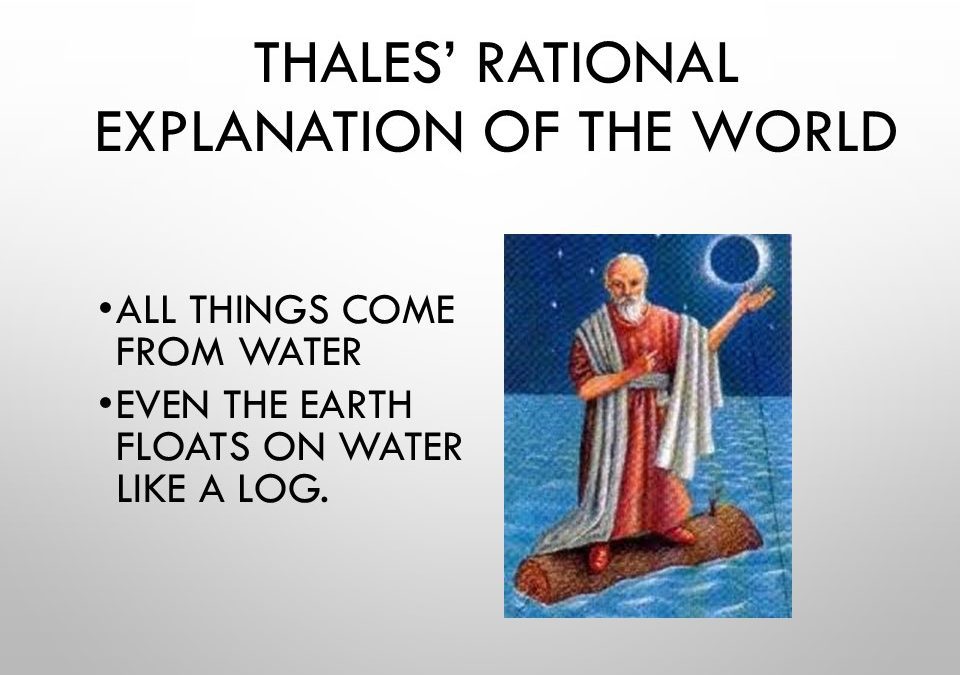
The philosophy of Anaximenes
29 Ottobre 2024
Programmare una gita scolastica di 3 giorni nella Riviera Romagnola
30 Ottobre 2024Imaginary Interview between Thales of Miletus and Robert Elmer Horton, famous idrologist
Robert Horton: Thales, it’s a great honor to speak with you. You’re remembered as the first Greek philosopher to propose a theory about the nature of the universe, rooted in water. How did you come to believe that water is the fundamental principle of all reality?
Thales: It’s a pleasure to be here, Robert. When I observed nature, I saw water everywhere: in rivers, seas, even the sky as rain. Water gives life to plants, sustains animals, and nourishes cities. I thought there must be something primordial, a substance from which all things arise and that is essential to life itself. I concluded that this substance was water.
Robert Horton: It’s incredible how advanced your intuition was for your time. In hydrology, we modern scientists understand water as part of a complex cycle – evaporation, condensation, precipitation. How do you think you might have viewed the water cycle if you had access to scientific tools?
Thales: I believe the water cycle supports my initial observations. Water moves and transforms in ways visible even to the naked eye, like mist rising from rivers or clouds bringing rain. If I’d had tools to measure and analyze these changes, I likely would have gained an even greater understanding of water’s role as the archê, the primary element of all things.
Robert Horton: In my field, we see water both as a resource and a challenge. We study sustainable water management to avoid floods and droughts. How would you have interpreted these phenomena?
Thales: Floods and droughts remind us of water’s power and our dependence on it. In my time, these events were often seen as expressions of divine will. But I think, with your modern understanding, we could see these variations as part of a natural balance, needing wisdom and respect to manage.
Robert Horton: You’re considered the father of Western philosophy for introducing the idea that there is a natural order that can be understood through reason. If I told you that today we know water is composed of hydrogen and oxygen atoms, how would you react?
Thales: Ah, hydrogen and oxygen! It’s fascinating to think that water itself could be broken down into even smaller elements. This discovery makes me wonder about the true “unity” of all things. Perhaps my concept of “water” was symbolic, representing the idea of interconnectedness among all elements.
Robert Horton: Your intuition, Thales, was remarkably forward-thinking. Do you have any advice for us modern scientists?
Thales: Yes, remember that science must always serve life, not dominate it. When you discover new aspects of the natural world, don’t forget to step back and contemplate the unity that binds us to everything around us.
Questa conversazione esplora le intuizioni di Talete sull’acqua come principio fondamentale della realtà e le prospettive moderne dell’idrologia.
The Idea of Thales’ “Arché” as Water
Thales’ idea of “arché” as water had significant implications for our modern understanding of the universe, even though we now know that water itself is composed of smaller elements.
Thales’ insight paved the way for modern science, introducing the concept that there is a natural order that can be understood through reason. This encouraged observation and analysis of the natural world, leading to the birth of Western science and philosophy.
While water is no longer considered the fundamental element of the universe, Thales’ search for a unifying principle of reality remains a central question in modern science. For instance, modern physics seeks a “theory of everything” that could explain all the forces and particles in the universe.
Thales’ emphasis on the importance of water for life remains relevant today. Modern hydrology recognizes water’s crucial role for ecosystems, agriculture, and human life. Sustainable management of water resources is a significant challenge we face today, just as Thales might have foreseen.
Finally, Thales’ advice to remember “the unity that binds us to all that surrounds us” is an important reminder for modern science. Science must serve life, not dominate it, and we must consider the ethical and social implications of our scientific discoveries.
What is the Role of Water in Thales of Miletus’ Thought?
The Central Role of Water for Thales
For Thales of Miletus, water was not merely a natural element but the arché, the fundamental principle from which everything originates and to which everything returns. Thales reached this conclusion by observing nature and noting the omnipresence of water: in rivers, seas, and even in the sky as rain.
According to Thales, water was the primordial substance essential for life itself: it nourishes plants, quenches animals, and sustains cities. His insight, although formulated in an era with limited scientific tools, astonishingly anticipated the modern understanding of the water cycle and its vital role for life.
Thales believed that natural phenomena, like mist rising from rivers or rain descending from clouds, demonstrated water’s ability to change and transform, affirming its nature as a universal principle.
His view of water as the arché was not limited to simple empirical observation but represented an attempt to understand natural order through reason, paving the way for Western philosophy and science.
The fact that today we know water is composed of smaller elements, such as hydrogen and oxygen, does not diminish Thales’ insight. On the contrary, he might have believed that this discovery reinforces his idea of the “unity” of all things, with water as a symbol of the interconnectedness of all elements.
In conclusion, for Thales, water was much more than a mere substance: it was the vital principle, the engine of change, the symbol of cosmic unity. His insight, despite the limitations of his era, remains a fundamental reference point for our understanding of the universe and the crucial role that water plays within it.
FILOSOFIA ANTICA
materiale didattico e appunti su atuttascuola
-
Presocratici in formato pdf di Sandro Borzoni
-
Talete – filosofia di Miriam Gaudio
-
Appunti di filosofia greca Secondo modulo di filosofia antica: studio del pensiero da una prospettiva diversa, riflessioni e commenti dei testi di Anassimandro, Eraclito, Parmenide, Melisso e Simplicio – di Alissa Peron
-
Pitagora
-
Eraclito
-
Zenone
materiale didattico e appunti su altri siti
-
Gli inizi della filosofia di Fabio Utili
-
Gli inizi della filosofia in power point (140 kbyte) della prof.ssa Marialuisa Dimase*
-
Presocratici, la natura e l’uomo di Fabio Utili
-
Le prime scuole filosofiche in power point della prof.ssa Scalini del Liceo Malpighi di Bologna
-
Dizionarietto dei termini greci di Fabio Utili
-
Il mistero delle origini di Hans Georg Gadamer
Talete
-
Talete di Diego Fusaro
-
Talete il padre dell’astronomia razionale di Aldo Bonet, su www.matematicamente.it
Anassimandro

-
Appunti di filosofia greca Secondo modulo di filosofia antica: studio del pensiero da una prospettiva diversa, riflessioni e commenti dei testi di Anassimandro, Eraclito, Parmenide, Melisso e Simplicio – di Alissa Peron
-
Anassimandro di Diego Fusaro
Audio Lezioni, ascolta il podcast di Filosofia del prof. Gaudio
Ascolta “Filosofia” su Spreaker.




